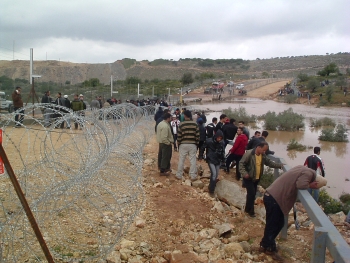Friday’s Bil’in demonstration was a memorial for the twelfth victim of the apartheid wall. Eyad Taha Salame Taha, a 28 year-old man from Beit Annan, was drowned in a flood caused by the wall in Bil’in on Sunday, April 2, 2006.

Grills covering the drainage pipes that in the flash flood formed a dam. Mud carried by the water sticks to the concrete surrounding the pipes and shows the height of the flood. Top left: Villagers errect a makeshift monument to Eyad.
Eyad and his brother, Raad, were traveling to work when flood waters swept their car away. They got out of the car and were washed towards the barrier by strong currents. Raad was rescued by villagers, but Eyad was found unconscious, entangled in the razor wire of the apartheid barrier.
The site on the day of the flood. The foliage in the water is submerged olive trees.
Local Bil’in activists, joined by Israelis and internationals, held their weekly peaceful demonstration by the wall next to the village. Two people from the village were arrested, including Mohammed Khatib from the Bil’in popular committee against the wall. As long as
international activists were filming, the soldiers treated the detainees well, but when the cameras were gone, the soldiers beat them up. They were both released after the demonstration.
After demonstrating at the usual site, the activists marched to the place where Eyad was drowned. The villagers put up a makeshift monument with posters and lavender to honor Eyad. Speeches were given about this horrible loss and about how the wall was to blame. The activists charged that the Israeli government should be held responsible for this death.
Posters of Eyad Taha Salame Taha on the razor wire that forms this part of the wall.
Eyad’s tragic death highlights the reality of the destructive effects of the wall on the lives of Palestinians in Bil’in and elsewhere along the wall.
Unfortunately, his is not the first life lost as a result of the wall. Eleven others lost their lives in demonstrations against the illegal annexation barrier, including five children under the age of 16.
Mohammad Fadel Hashem Rayan, age 25, from Beit Duko was killed in Beit Ijza on February 26, 2004 by live ammunition shot at him by border police during a demonstration against the wall.
Zakaria MaHmud Salem, age 28, from Beit Ijza was killed in Beit Ijza on February 26, 2004 by live ammunition shot at him by border police during a demonstration against the wall.
Abdal Rahman Abu Eid, age 62, from Bidu was killed in Bidu on February 26, 2004 from a heart attack after his house was tear gassed.
Mohammad Daud Badwan, age 21, from Bidu was shot by border police snipers during a demonstration in Biddu on March 26, 2004 and died April 3, 2004.
Diaa Abdel Karim Abu Eid, age 24, from Bidu was killed in Bidu by live ammunition shot at him during a demonstration against the wall on April 4, 2004.
Hussain mahmud Awwad Aliyan, age 17, from Budrus, was killed in Beitunia on April 16, 2004 at a demonstration against the wall, after live ammunition was shot at demonstrators.
Islam Hashem Rizik Zhahran, age 14, from Deir Abu Mashal was shot with a rubber coated metal bullet in Deir Anu Mashal on April 18, 2004 and died April 28, 2004.
Alaa Mohammad Abdel Rahman Khalil, age 14, from Betunia was killed in Betunia February 15, 2005 by live ammunition shot by a security guard while throwing stones at a wall security jeep.
Jamal Jaber Ibrahim Assi, age 15, from Beit Likya was killed in Beit Likya on May 4, 2005 by live ammunition shot in his pelvis while throwing stones in a demonstration against the wall.
Odai Mofeed Mahmud Assi, age 14, from Beit Likya was killed in Beit Likya on May 4, 2005 by live ammunition shot in his chest while throwing stones in a demonstration against the wall.
Mahayub Nimer Assi, age 15, from Beit Likya was killed in Beit Likya on June 8, 2005 by live ammunition shot by a security guard while he was at his family’s orchards, about 200 meters from the bulldozers parking lot.
It is the hope of activists, as we continue our protests and demonstrations, that these lives will not have been lost in vain. It is in their memory that we protest tomorrow and every day thereafter.


